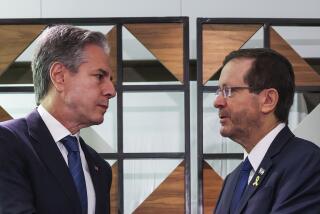Top U.S. Expert on Middle East to Visit Cairo, Amman, Jerusalem in Bid to Spur Peace Process
WASHINGTON — The Reagan Administration’s top Mideast specialist will visit Cairo, Amman and Jerusalem starting this week to try to revive the peace process after a chilly reception that the recent Arab League summit meeting gave King Hussein’s plan for a Jordanian-Palestinian approach to negotiations, it was announced Monday.
A senior Administration official said Richard W. Murphy, assistant secretary of state for Near Eastern and South Asian affairs, will attempt to break the impasse over the question of which Palestinians would be allowed to join a mixed delegation of Jordanians and Palestinians in long-discussed preliminary talks with the United States.
The official, who declined to be identified by name, said it was possible that arrangements for the talks with the Jordanian-Palestinian group could be completed during the trip. In that case, he said, Murphy might meet with the delegation on the spot. Jordan says it wants such a meeting in advance of possible negotiations with Israel.
‘Right Time’
But the official warned that no agreements have been reached yet. “We think it’s the right time for Dick (Murphy) to go out and have those conversations,” the official said. “(But) it’s not that the situation has dramatically changed in the last couple of weeks.”
For security reasons, no specific dates for the trip were announced.
The United States was clearly disappointed that last week’s Arab summit in Casablanca, Morocco, failed to endorse Hussein’s plan. The Jordanian monarch has made it clear that he will not enter negotiations with Israel unless he obtains substantial support from other Arab nations.
Murphy’s stop in Egypt is intended to generate some moral support for Hussein. Egypt, which has been excluded from Arab summits since then-President Anwar Sadat made peace with Israel in 1979, supports Hussein’s plan.
Sadat’s successor as Egyptian president, Hosni Mubarak, is expected to assure Murphy that Cairo will do everything it can to bring about the talks. At the same time, Mubarak is expected to urge Murphy to drop U.S. objections to some Palestinian participants and thus permit an early meeting with the Jordanian-Palestinian delegation. This would presumably give a symbolic boost to the king’s proposals.
Arab-Israeli Talks
Hussein, during a visit to Washington last spring, proposed talks between the United States and a Jordanian-Palestinian delegation. The United States agreed to participate, provided the talks would advance the ultimate goal of face-to-face negotiations between the Arabs and Israel.
Preparations stalled, however, because of a dispute over the Palestinian participants. Hussein insists on including only Palestinians nominated by the Palestine Libration Organization; the United States, honoring a longstanding pledge to Israel, refuses to negotiate with PLO members.
So far, the sides have been unable to agree on a list of people who are not members of the PLO but are acceptable to it.
Jordan has submitted a list of seven names of possible Palestinian participants, and Israeli Prime Minister Shimon Peres said two of them were acceptable to him. Murphy, meanwhile, said recently that “some” names on the list were acceptable to Washington, but he did not say how many or if the names approved by the United States went beyond those acceptable to Peres.
For its part, Israel has said it is prepared to negotiate with a joint Arab delegation, provided the Palestinians are not members of the PLO. But it is openly skeptical about a preliminary meeting between the United States and the Jordanian-Palestinian team.
Still Real Differences
The senior Administration official said Washington and Amman are still far apart on a number of issues. But he said it is encouraging that Jordan is willing to negotiate without seeking a guaranteed outcome in advance.
“For the last 18 years, the Arab side has generally said they’re not going to sit down and negotiate until they know what’s going to happen, and we’ve been very American about it in saying, ‘That isn’t the way you do things--you’ve got to negotiate, you’ve got to talk about process.’ Well, King Hussein now is, in a way, speaking American,” the official said. “He’s saying, ‘OK, let’s talk about process’ . . . . That’s been a major step forward.”
Despite U.S. disappointment that the Casablanca summit failed to endorse the Hussein plan, an Arab diplomat said the outcome of the meeting was more favorable to the peace process than any previous such session.
The diplomat noted that although the session did not support Hussein’s plan, neither did it explicitly reject it. In addition, he said, the summit endorsed Yasser Arafat as leader of the PLO, rejecting Syrian-backed contenders for that title. This strengthened Hussein’s position, which is based on an agreement with Arafat.
More to Read
Sign up for Essential California
The most important California stories and recommendations in your inbox every morning.
You may occasionally receive promotional content from the Los Angeles Times.










